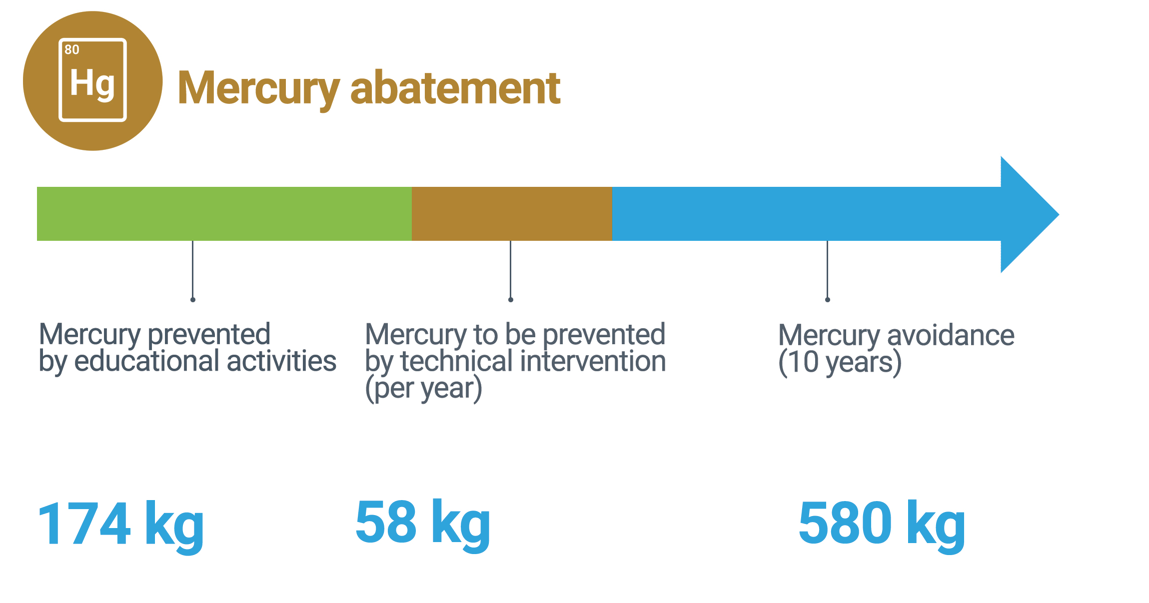To address the human health and environmental issues caused by the illegal use of mercury in ASGM—and to promote sustainable development opportunities—the planetGOLD Mongolia project has been implemented since 2019 under the planetGOLD programme. The programme is funded by the Global Environment Facility, led by the United Nations Environment Programme, and implemented in partnership with the United Nations Industrial Development Organization. The project is executed by the Artisanal Gold Council of Canada in collaboration with the Ministry of Environment and Climate Change of Mongolia (MECC).
ADVANCING FORMALIZATION AND SUPPORTING POLICY FRAMEWORKS
The formalization of artisanal and small-scale gold mining (ASGM) plays a critical role in preventing the negative environmental impacts and land degradation caused due to the potential use of mercury and illegal gold mining operations. Therefore, the project provided extensive technical support and policy recommendations to improve the legal environment, support formalized and responsible mining, and protect the environment.
Key results:
-
Targeted 1,090 artisanal miners and provided broad range of capacity building activities.
-
158 artisanal miners succesfully formalized through on-site technical and operational support.
-
Made a meaningful contribution to improving the legal environment by developing the following research reports and providing policy recommendations to key regulatory documents.
Inputs to ASM Legislations
-
Recommendations to ASM Regulation revision
-
Recommendations to ensure proper implementation of ASM Regulation
-
Recommendations on Gold supply chain and gold trade formalization regulations
-
Proposal for the revision of the Minerals law
-
Assessment of the Artisanal Mining Sites (2019)
-
Contextual Study of the planetGOLD Mongolia Project Sites (2021)
-
Gender Mapping in the Artisanal Gold Mining Sector in Mongolia (2021)
-
Artisanal and Small-Scale Gold Trade in Mongolia (2022)
-
Legal Framework Analysis of the ASGM sector in Mongolia (2022)
-
Assessing the Gap: Artisanal Gold Miners and Social services (2024)
ACCESS TO RESPONSIBLE AND FORMAL GOLD MARKETS
-
158 miners were supported to meet planetGOLD criteria, enabling them to access responsible gold markets.
-
Financial access was improved for 50 artisanal miners.
One financial mechanism* was developed, which mobilized a revolving fund of USD140,695.
*The financial mechanism is linked to women-led Savings and Credit Cooperative (SCC) established in Tunkhel village, Mandal soum, Selenge province. The SCC operates in close connection with the mercury-free processing systems built by the project and allocates a portion of its profits to create a revolving fund for artisanal miners. This fund improves artisanal miners' access to finance and enables long-term investments in responsible mining.
MERCURY-FREE TECHNOLOGY
Two mercury-free processing systems (MFPS) were established in two locations in Mandal soum, Selenge province. A total of 158 artisanal miners directly benefited from these facilities and successfully transitioned to environmentally friendly processing technologies.

CAPACITY BUILDING ACTIVITIES AND TRAININGS
In collaboration with the ASM National Federation (ASM NF) of Mongolia, the project developed six tailored training modules to equip artisanal miners with essential knowledge and skills and to promote responsible ASGM practices. Through these modules, the project delivered systematic training sessions for miners.
The six training modules included:
-
Gender and Human Rights
-
Occupational Health and Safety
-
Better Environmental Practices
-
Responsible ASM and Good Practices
-
Formalization of Artisanal Mining
-
Business Management
In addition to these core modules, the project organized training sessions in partnership with the MECC, ASM NF, and local government organizations. These sessions focused on the Minamata Convention, its implementation, mercury poisoning prevention, environmental rehabilitation, and formalization of artisanal mining.
In total, 3,578 individuals, including artisanal miners and government officials, participated in these capacity-building activities.
GENDER MAINSTREAMING
The project prioritized gender equality and inclusiveness throughout its activities. Key outcomes included:
-
Establishment of Gender Committee in Mandal soum, Selenge province.
-
Preparation of Gender focal points to promote gender-responsive practices within the artisanal mining communities.
KNOWLEDGE MANAGEMENT AND SUSTAINABILITY
All knowledge developed under the project, including brochures, articles, videos, and policy reports, are accessible through the following web-based platforms:
-
Ulaanbaatar City Public Library named after D. Natsagdorj
-
Library of the National University of Mongolia
Sustainability Ensuring Partnerships
One of the most valuable outcomes of the project is the strong partnerships built with key stakeholders, including government organizations, local authorities, artisanal mining organizations, and artisanal miners themselves.
These partners have now gained the capacity and ownership to continue applying the knowledge, methodologies, and models developed by the project, and to expand its impact to other regions.
The planetGOLD Mongolia project is successfully completed making a significant contribution in fulfilling the obligations and commitments of Mongolia under the international treaties and conventions, preventing from potential mercury use in artisanal gold mining, improving mining practices and ore processing technologies, formalization of the sector, and strengthening the ASM legal environment.